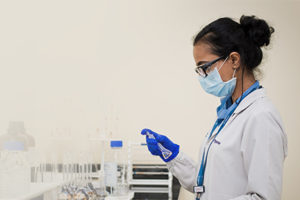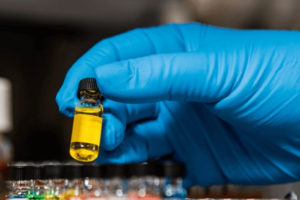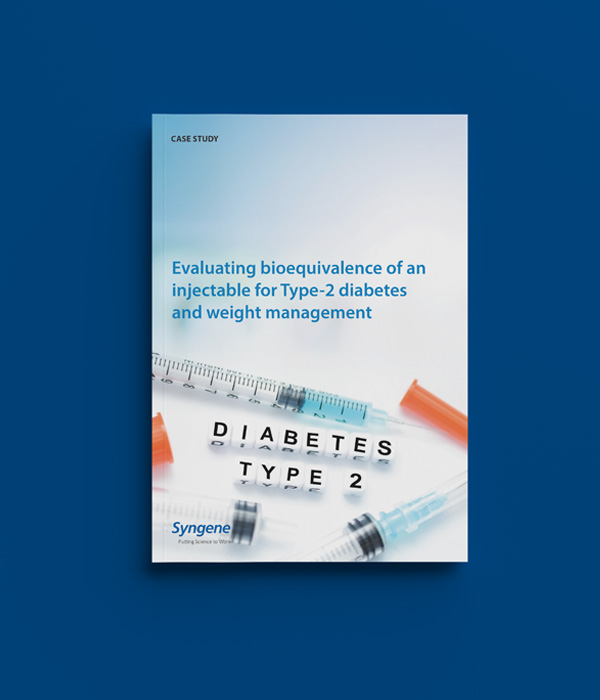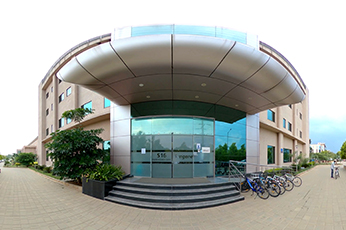The requirement
A global pharma company was searching for a partner to outsource Human Pharmacological studies for Semaglutide. The reference drug,Ozempic, was an anti-diabetes and anti-obesity medication for treating Type-2 diabetes and for long-term weight management. The study was to evaluate the pharmacokinetics and safety aspect of Semaglutide administered as an injectable in healthy adults. It was also meant to establish bioequivalence between the client’s Test product and the reference product (Ozempic) for filing an abbreviated new drug application (ANDA) for marketing authorization in the European Union.Semaglutide (1 mg) would be injected into healthy study subjects in the abdominal region via a pre-filled pen under fasting conditions. Since the drug has a long half-life, the study would involve the collection of blood samples from the study subjects over a 28-day duration, including a washout period of 48 days between each dose.
The challenge
Clinical Challanges
- Long duration of the study required multiple visits by subjects and PK sampling time points, which could lead to recruitment delays and missed visits, affecting the study outcome
- High initial dose of 1 mg of Semaglutide to be injected. The dose was known to cause a higher number of gastrointestinal side effects—mostly of mild-to-moderate degree
- Nausea and vomiting are among the adverse events encountered, followed by diarrhea and fatigue
- Adverse events, either episodic or lasting for a longer duration, with some subjects unable to tolerate the dose
- Reduced appetite among subjects due to the physiological effect of the drug, lasting for long durations
- Nature of adverse events leading to a lack of interest in continuing with the study project
Analytical Challenges
- Developing LC-MS/MS assays for biologics (small proteins) requires a range of scientific and operational experts to execute complex bioanalytical methods. Generally, only large biopharma companies possess this capability in-house
- Before applying LC-MS/MS methods, the therapeutic peptides must be quantified using immunoassay platforms. However, the quantification was not specific to LC-MS/MS platforms
- Need for developed and validated LC-MS/MS assay methods for peptides, which can be successfully applied for clinical study sample analysis.
The Solution
Clinical solution
As a first step, we decided to implement a risk management strategy. This involved foreseeing all the project risks in advance and analyzing them. After gathering inputs through multiple meetings, we prepared a Risk Register, where all the risks were graded and mapped.
The next step was recruiting volunteers for the project. Since Syngene has a large pool of healthy volunteers, recruitment of subjects did not pose any hurdles. Prior to recruitment, we trained our project staff in IMP administration procedure (subcutaneous injection of 1 mg Semaglutide via a pre-filled pen).
As the study progressed, more subjects started complaining about adverse events of mild to moderate severity. Many had recurring gastrointestinal side effects. Several subjects also complained of drastic loss in appetite because of the physiological effect of the drug, which lasted for long durations.
The Syngene investigator team analyzed the situation and devised solutions in consultation with the client and internal teams. Subjects were counseled and also educated about the nature of the drug and its physiological effects to help them reduce their anxiety. They were also provided with appropriate treatments based on the nature and severity of the side effects. Further, every effort was made to improve their nutrition levels by suggesting alternatives based on individual food preferences.
Throughout the study, regular communication was maintained with the subjects to ensure their health and safety at every stage. They were provided accommodation near Syngene’s Clinical Unit to ensure prompt access to healthcare at all times. Due care was also taken to discharge them only after a complete health assessment.
The active efforts of the project staff ensured the successful completion of the project. The client, keenly supervising the project, was satisfied with Syngene’s process and the outcome. Overall, the product was declared to have met the study objective —a significant milestone for both the client and Syngene’s translational and clinical research team.
Analytical solution
As part of Analytical services, Syngene undertook quantification of Semaglutide by LC-MSMS (API 6500) in human plasma. This involved gradient elution for chromatography to separate the analyte peak from endogenous interferences.
The next step was overcoming assay challenges related to the sensitivity of LLOQ, column/system block, deficient chromatography, and autosampler carryover. We ensured sensitivity as per the gradient composition and mass spectrometer parameters. Issues with column and system block were resolved with frequent flushing of the system and column. Similarly, carryover was optimized using various gradient compositions.
Conclusion
The project is a prime example of why Syngene is a trusted partner for BA/BE studies for small molecules and biologics. Testament to the high quality of work we deliver is the fact that nearly 80% of our business is from existing clients.
Our Human Pharmacology Unit comprises state-of-the-art infrastructure, an in-house bioanalytical lab, and an intensive care unit, among other facilities. We have a pool of 23,000+ healthy volunteers and a low drop-out rate of <5%. Further, with experience in >800 BA/BE studies and Phase-1 clinical trials, our scientists have significant experience in handling complex clinical studies.
To know more about our capabilities in artificial intelligence, contact our experts.











